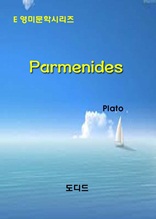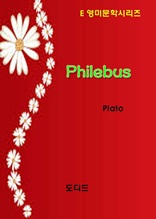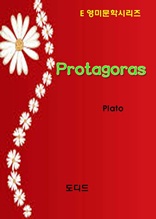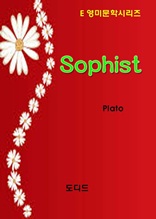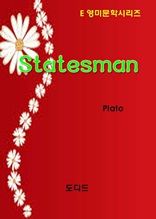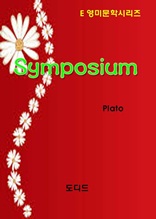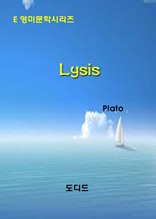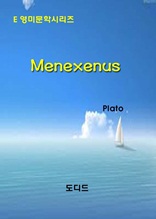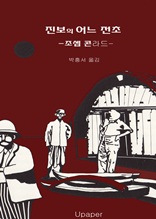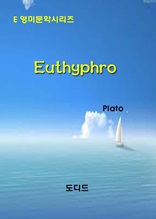Parmenides
도서정보 : Plato | 2014-03-19 | EPUB파일
지원기기 : PC / Android / iOS
Parmenides of Elea (Ancient Greek Παρμεν?δη? ?λε?τη? fl. 5th century BCE) was an ancient Greek philosopher born in Elea a Greek city on the southern coast of Magna Graecia. He was the founder of the Eleatic school of philosophy. The single known work of Parmenides is a poem On Nature which has survived only in fragmentary form. In this poem Parmenides describes two views of reality. In "the way of truth" (a part of the poem) he explains how reality (coined as "what-is") is one change is impossible and existence is timeless uniform necessary and unchanging. In "the way of opinion " he explains the world of appearances in which one s sensory faculties lead to conceptions which are false and deceitful. These ideas strongly influenced the whole of Western philosophy perhaps most notably through their effect on Plato.
구매가격 : 1,000 원
Philebus
도서정보 : Plato | 2014-03-19 | EPUB파일
지원기기 : PC / Android / iOS
The Philebus (occasionally given as Philebos Greek Φ?ληβο?) is one of the surviving Socratic dialogues written in the 4th century BC by the ancient Greek philosopher Plato. Apart from Socrates the primary speaker in Philebus the other speakers are Philebus and Protarchus. But Philebus who wants to defend the life of pleasure hedonism which Socrates describes as the life of an oyster hardly participates and his position has to be defended by Protarchus who has learnt argumentation from Sophists. Manuscripts of the work give it the subtitle "peri h?don?s ?thikos" indicating that it is "concerning pleasure" and that it is a work about "ethics" or in other words the question of the best way of life. However "there are large parts in the dialogue that deal with dialectics and ontology but have nothing to do with pleasure and ethics or if so only indirectly".
구매가격 : 1,000 원
Protagoras
도서정보 : Plato | 2014-03-19 | EPUB파일
지원기기 : PC / Android / iOS
The Protagoras like several of the Dialogues of Plato is put into the mouth of Socrates who describes a conversation which had taken place between himself and the great Sophist at the house of Callias-- the man who had spent more upon the Sophists than all the rest of the world --and in which the learned Hippias and the grammarian Prodicus had also shared as well as Alcibiades and Critias both of whom said a few words--in the presence of a distinguished company consisting of disciples of Protagoras and of leading Athenians belonging to the Socratic circle. The dialogue commences with a request on the part of Hippocrates that Socrates would introduce him to the celebrated teacher. He has come before the dawn had risen--so fervid is his zeal. Socrates moderates his excitement and advises him to find out what Protagoras will make of him before he becomes his pupil. They go together to the house of Callias and Socrates after explaining the purpose of their visit to Protagoras asks the question What he will make of Hippocrates. Protagoras answers That he will make him a better and a wiser man. But in what will he be better? --Socrates desires to have a more precise answer. Protagoras replies That he will teach him prudence in affairs private and public in short the science or knowledge of human life.
구매가격 : 1,000 원
Sophist
도서정보 : Plato | 2014-03-19 | EPUB파일
지원기기 : PC / Android / iOS
The dramatic power of the dialogues of Plato appears to diminish as the metaphysical interest of them increases (compare Introd. to the Philebus). There are no descriptions of time place or persons in the Sophist and Statesman but we are plunged at once into philosophical discussions the poetical charm has disappeared and those who have no taste for abstruse metaphysics will greatly prefer the earlier dialogues to the later ones. Plato is conscious of the change and in the Statesman expressly accuses himself of a tediousness in the two dialogues which he ascribes to his desire of developing the dialectical method. On the other hand the kindred spirit of Hegel seemed to find in the Sophist the crown and summit of the Platonic philosophy--here is the place at which Plato most nearly approaches to the Hegelian identity of Being and Not-being. Nor will the great importance of the two dialogues be doubted by any one who forms a conception of the state of mind and opinion which they are intended to meet. The sophisms of the day were undermining philosophy the denial of the existence of Not-being and of the connexion of ideas was making truth and falsehood equally impossible.
구매가격 : 1,000 원
Statesman
도서정보 : Plato | 2014-03-19 | EPUB파일
지원기기 : PC / Android / iOS
In the Phaedrus the Republic the Philebus the Parmenides and the Sophist we may observe the tendency of Plato to combine two or more subjects or different aspects of the same subject in a single dialogue. In the Sophist and Statesman especially we note that the discussion is partly regarded as an illustration of method and that analogies are brought from afar which throw light on the main subject. And in his later writings generally we further remark a decline of style and of dramatic power the characters excite little or no interest and the digressions are apt to overlay the main thesis there is not the callida junctura of an artistic whole. Both the serious discussions and the jests are sometimes out of place. The invincible Socrates is withdrawn from view and new foes begin to appear under old names. Plato is now chiefly concerned not with the original Sophist but with the sophistry of the schools of philosophy which are making reasoning impossible and is driven by them out of the regions of transcendental speculation back into the path of common sense. A logical or psychological phase takes the place of the doctrine of Ideas in his mind. He is constantly dwelling on the importance of regular classification and of not putting words in the place of things. He has banished the poets and is beginning to use a technical language. He is bitter and satirical and seems to be sadly conscious of the realities of human life. Yet the ideal glory of the Platonic philosophy is not extinguished. He is still looking for a city in which kings are either philosophers or gods (compare Laws).
구매가격 : 1,000 원
Symposium
도서정보 : Plato | 2014-03-19 | EPUB파일
지원기기 : PC / Android / iOS
The Symposium (Ancient Greek Συμπ?σιον) is a philosophical text by Plato dated c. 385?380 BCE. It concerns itself at one level with the genesis purpose and nature of love and (in latter-day interpretations) is the origin of the concept of Platonic love. Love is examined in a sequence of speeches by men attending a symposium or drinking party. Each man must deliver an encomium a speech in praise of Love (Eros). The party takes place at the house of the tragedian Agathon in Athens. Socrates in his speech asserts that the highest purpose of love is to become a philosopher or literally a lover of wisdom. The dialogue has been used as a source by social historians seeking to throw light on life in ancient Athens in particular upon sexual behavior and the symposium as an institution.
구매가격 : 1,000 원
Lysis
도서정보 : Plato | 2014-03-18 | EPUB파일
지원기기 : PC / Android / iOS
I was going from the Academy straight to the Lyceum intending to take the outer road which is close under the wall. When I came to the postern gate of the city which is by the fountain of Panops I fell in with Hippothales the son of Hieronymus and Ctesippus the Paeanian and a company of young men who were standing with them. Hippothales seeing me approach asked whence I came and whither I was going. I am going I replied from the Academy straight to the Lyceum. Then come straight to us he said and put in here you may as well. Who are you I said and where am I to come? He showed me an enclosed space and an open door over against the wall. And there he said is the building at which we all meet and a goodly company we are. And what is this building I asked and what sort of entertainment have you? The building he replied is a newly erected Palaestra and the entertainment is generally conversation to which you are welcome.
구매가격 : 1,000 원
Menexenus
도서정보 : Plato | 2014-03-18 | EPUB파일
지원기기 : PC / Android / iOS
It seems impossible to separate by any exact line the genuine writings of Plato from the spurious. The only external evidence to them which is of much value is that of Aristotle for the Alexandrian catalogues of a century later include manifest forgeries. Even the value of the Aristotelian authority is a good deal impaired by the uncertainty concerning the date and authorship of the writings which are ascribed to him. And several of the citations of Aristotle omit the name of Plato and some of them omit the name of the dialogue from which they are taken. Prior however to the enquiry about the writings of a particular author general considerations which equally affect all evidence to the genuineness of ancient writings are the following Shorter works are more likely to have been forged or to have received an erroneous designation than longer ones and some kinds of composition such as epistles or panegyrical orations are more liable to suspicion than others those again which have a taste of sophistry in them or the ring of a later age or the slighter character of a rhetorical exercise or in which a motive or some affinity to spurious writings can be detected or which seem to have originated in a name or statement really occurring in some classical author are also of doubtful credit while there is no instance of any ancient writing proved to be a forgery which combines excellence with length. A really great and original writer would have no object in fathering his works on Plato and to the forger or imitator the literary hack of Alexandria and Athens the Gods did not grant originality or genius. Further in attempting to balance the evidence for and against a Platonic dialogue we must not forget that the form of the Platonic writing was common to several of his contemporaries. Aeschines Euclid Phaedo Antisthenes and in the next generation Aristotle are all said to have composed dialogues and mistakes of names are very likely to have occurred. Greek literature in the third century before Christ was almost as voluminous as our own and without the safeguards of regular publication or printing or binding or even of distinct titles. An unknown writing was naturally attributed to a known writer whose works bore the same character and the name once appended easily obtained authority. A tendency may also be observed to blend the works and opinions of the master with those of his scholars. To a later Platonist the difference between Plato and his imitators was not so perceptible as to ourselves. The Memorabilia of Xenophon and the Dialogues of Plato are but a part of a considerable Socratic literature which has passed away. And we must consider how we should regard the question of the genuineness of a particular writing if this lost literature had been preserved to us.
구매가격 : 500 원
진보의 어느 전초
도서정보 : 조셉 콘라드 | 2014-03-18 | EPUB파일
지원기기 : PC / Android / iOS
케이어츠와 캐얼리어는 희극적이고 동시에 비극적인 두 인물이 정글 지대에 팽개쳐진 채 시간이 경과함에 따라 결국은 자신들이 진보와 문명의 우둔한 희생자들임을 깨닫게 된다. “진보의 어느 전초”는 진보와 문명이라는 가면을 쓴 채 인간과 자연에 대한 착취 라는 19세기 유럽 식민주의와 그 위선적인 인도주의에 관한 이야기이다.
구매가격 : 3,000 원
Euthyphro
도서정보 : Plato | 2014-03-17 | EPUB파일
지원기기 : PC / Android / iOS
This Euthyphro and Socrates are represented as meeting in the porch of the King Archon. (Cp. Theaet. sub fin.) Both have legal business in hand. Socrates is defendant in a suit for impiety which Meletus has brought against him (it is remarked by the way that he is not a likely man himself to have brought a suit against another) and Euthyphro too is plaintiff in an action for murder which he has brought against his own father. The latter has originated in the following manner ?A poor dependant of the family had slain one of their domestic slaves in Naxos. The guilty person was bound and thrown into a ditch by the command of Euthyphro’s father who sent to the interpreters of religion at Athens to ask what should be done with him. Before the messenger came back the criminal had died from hunger and exposure.
구매가격 : 1,000 원

